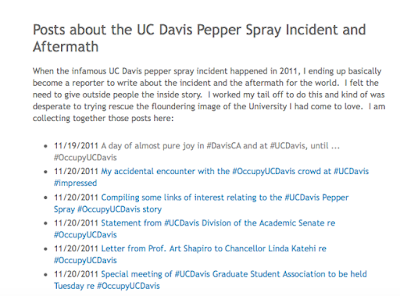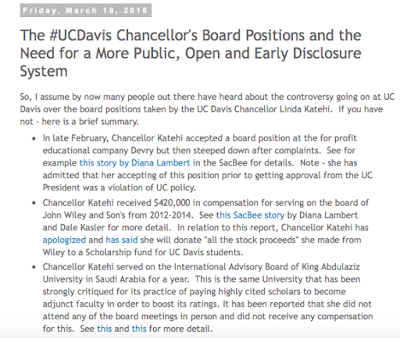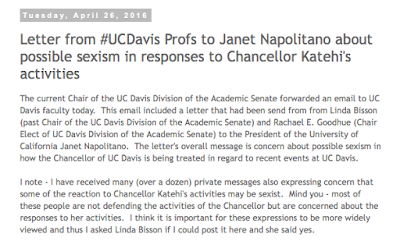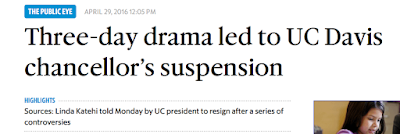--------
This is from the "Tree of Life Blog" of Jonathan Eisen, an evolutionary biologist and Open Access advocate at the University of California, Davis. For short updates, follow me on Twitter.
--------
Adam's Blogroll: click through to the author's blog

Again, I know I overdo this sometimes but I am certainly not hesitant to make my feelings know.Painful: #UCDavis Storer Lecture series - since 1963 87% of speakers are male https://t.co/uaBbnxPv5T pic.twitter.com/9GuFORRiqu— Jonathan Eisen (@phylogenomics) April 21, 2016


This is why I no longer use textbooks for courses. UC Davis chancellor received $420,000 on book publisher’s board https://t.co/q1evG9aTcG— Bruce Rannala (@BruceRannala) March 5, 2016
Am very disappointed in board membership choices by #UCDavis Chancellor Katehi but calls for resignation seem woefully reactionary (1/n)— Jonathan Eisen (@phylogenomics) March 5, 2016
Not trying to defend choices - I think she needs to disclose more details and actions (e.g., on Wiley) & how there was no COI (2/n)— Jonathan Eisen (@phylogenomics) March 5, 2016
But at this time, as far as I can tell no laws or policies were violated (actually it seems UC pushes / encourages board membership) 3/n— Jonathan Eisen (@phylogenomics) March 5, 2016
So rather than hanging Katehi out to dry as Janet Napolitano has done, better if UC took some responsibility 4/n pic.twitter.com/ovR7SY4Xet— Jonathan Eisen (@phylogenomics) March 5, 2016
What we need to do is systematically reverse the corporatization of UC from the top to the bottom and not just pick at one scab 5/n— Jonathan Eisen (@phylogenomics) March 5, 2016
#UCDavis Profs Niemeier & Beamish on UC Admins sitting on boards: Let’s focus on the process, not the person https://t.co/PWRY0ilXQd— Jonathan Eisen (@phylogenomics) March 10, 2016
.@jrossibarra @Graham_Coop @jonfwilkins can't imagine why students angry about Wiley Board https://t.co/NpYjGDj4N6 pic.twitter.com/rOAyWddufN— Jonathan Eisen (@phylogenomics) March 13, 2016
and @Graham_Coop the more I look at this "defense of Wiley" Board position from #UCDavis admins the more icky I feel pic.twitter.com/IAzYI3qgwR— Jonathan Eisen (@phylogenomics) March 12, 2016
Well, $&(!#$&*@#$&@#*)Y: #UCDavis spent thousands to scrub pepper-spray references from Internet https://t.co/u3carw6IDo— Jonathan Eisen (@phylogenomics) April 14, 2016
Did I mention $&*@)!@&$_*(_!$)~(*_$&_!^@)*%&^)!*@&^)^%*&!^@))&*^%)^&!@^)&%!@#) https://t.co/hS6dVV3NDW— Jonathan Eisen (@phylogenomics) April 14, 2016
And I just decided that I felt the need to post about it a lot. For example:So is #UCDavis now going to hire same company to scrub internet of stories about them scrubbing internet? https://t.co/hS6dVV3NDW— Jonathan Eisen (@phylogenomics) April 14, 2016
Re https://t.co/u3carw6IDo The pepper spray incident & aftermath wasn't something to scrub from the internet but something to learn from 1/2— Jonathan Eisen (@phylogenomics) April 14, 2016
One does not learn from something by erasing a record of it. This is maddening #ucdavis #verysad 2/2 https://t.co/feuaKqT0lO— Jonathan Eisen (@phylogenomics) April 14, 2016
Phew: Now it feels really scrubbed https://t.co/py0fQWjAnj— Jonathan Eisen (@phylogenomics) April 14, 2016
And the third supportive narrative was complicated. After all just liking what people have done in some area is not enough to grant them a pass on transgressions. We needed to examine the current actions in detail to figure out just how bad they were. But the fourth supportive narrative struck a cord with me. Why? Well, because I have worked for years with Chancellor Katehi on some issues in bias against women. And I have become actively involved in fighting implicit and explicit bias against women in academia and it is pervasive. And I deeply respect the people who kept bringing up this issue.Ugh #UCDavis implies marketing led to high ranking of Vet School and C&ES not quality https://t.co/jWd1tffNmh pic.twitter.com/7jesFF2ofR— Jonathan Eisen (@phylogenomics) April 15, 2016


Just got this email forwarded from #UCDavis Chancellor Katehi on her commitment to staying as Chancellor pic.twitter.com/hTJKVnH15d— Jonathan Eisen (@phylogenomics) April 27, 2016
Read the ‘listening reports’ that UC Davis’ PR firm provided Katehi’s aides: https://t.co/kU71jha3RQ— dianalambert (@dianalambert) April 29, 2016
So @dianalambert those are painful - includes reports about @mbeisen @lpachter @BruceRannala and more #ucdavis role in this is pathetic— Jonathan Eisen (@phylogenomics) April 29, 2016
@phylogenomics @dianalambert @mbeisen @lpachter @BruceRannala impressive: top "influencer", in front of @sacbee_news pic.twitter.com/4Cu9upwmJC— Fabian Rivera-Chávez (@FabianRChavez) April 29, 2016
So after all the saga, after all the rehashing of my prior responses, I feel torn still. I get that there is real sexism in how women and women leaders are treated. I have been fighting such sexism for years and been inspired by how Chancellor Katehi@ted_geier @sacbee_news communications coming from #UCDavis admin are disastrously bad (eg see https://t.co/Hd5lzDxbp6 by @MarcosBreton)— Jonathan Eisen (@phylogenomics) April 19, 2016
Well worth reading: https://t.co/ZqqKJApKUa— Alex L (@AlexLey) May 2, 2016
If you’re following #UCDavis and the Katehi saga you owe it to yourself to read this @phylogenomics post. https://t.co/WwGssfXyez— Kent Holsinger (@keholsinger) May 2, 2016
UPDATE May 4, 2016. 9 PM. After a lot of thought and discussions with many many many people about this post and about Chancellor Katehi I have come to the conclusion that we need a new Chancellor at UC Davis. I have come to this conclusion for many reasons which I will try to write about as soon as possible.Punchline (don't let that abbreviate his nuances/keep you from reading important faculty thoughts): new chancellor. https://t.co/RilOZsISoq— Ted Geier (@ted_geier) May 1, 2016
Posted by in Janet Napolitano, Linda Katehi, Marcos Breton, PR, Sacramento Bee, seo, Sexism, UC Davis, Women in STEM
“…. Finally, the gender, race, religion has never been, to my opinion, valuable ways to select presenters of scientific works. The selection of the Plenary Lectures has been made by the Organizing Committee, that comprises a woman, based on the topic, then the best possible speaker on the topic…. I am aware of the current debate in our societies about "minimum numbers". I do not think they would help the cause of women in science.”While this organizer was not supportive or responsive to my speaker suggestions, five senior (famous) faculty members in the field were hyper-supportive. Upon hearing this story, they each contacted the organizer and expressed their concern about the lack of diversity. It was too late to change the program for the conference that year. However, in every subsequent year, the plenary speakers at this conference have included women and other underrepresented groups. So, it’s possible that a simple email from a young scientist can make a difference, particularly with the help of senior faculty.
Posted by in conferences, gender bias, gender ratio, Women in STEM, YAMMM
Will be an excellent symposium! Register here @UCPlantBreeding http://t.co/Nd86UAr3hJ
— Gena Hoffman (@GenaEHoffman) March 24, 2015@GenaEHoffman @UCPlantBreeding sadly the gender ratio of speakers is pretty disappointing - looks like about 14:1 M:F #STEMWomen
— Jonathan Eisen (@phylogenomics) March 25, 2015 @phylogenomics @GenderAvenger Hey Jonathan, we were writing a response & 140 characters didn't cover it. #STEMWomen pic.twitter.com/rmGkSJTUBc
— PlantBreedingCenter (@UCPlantBreeding) March 25, 2015Posted by in conference, gender ratio, meetings, UC Davis, Women in STEM
Study: Higher gender + tenure diversity associated with higher productivity in GitHub teams, http://t.co/qHXOvMmGKb @github @phylogenomics
— UC Davis Engineering (@UCDavisCoE) January 23, 2015Software development is usually a collaborative venture. Open Source Software (OSS) projects are no exception; in- deed, by design, the OSS approach can accommodate teams that are more open, geographically distributed, and dynamic than commercial teams. This, we find, leads to OSS teams that are quite diverse. Team diversity, predominantly in of- fline groups, is known to correlate with team output, mostly with positive effects. How about in OSS?
Using GITHUB, the largest publicly available collection of OSS projects, we studied how gender and tenure diversity relate to team productivity and turnover. Using regression modeling of GITHUB data and the results of a survey, we show that both gender and tenure diversity are positive and significant predictors of productivity, together explaining a sizable fraction of the data variability. These results can inform decision making on all levels, leading to better out- comes in recruiting and performance.Really, really fascinating.
Posted by in gender, STEM, Women in STEM
Thus, I take your comment to heart and wanted you to know that I care about this issues as well. I would love to hear how you balance these inequities at your meetings and learn as much as I can. Thank you for taking the time to bring this up I know how busy you are and appreciate your candor. Truly looking forward to more scientific exchanges and perhaps some education around gender issues.And I wrote back, quickly, without digging into the literature or all the posts in the world about this some quick suggestions which I think others might find useful. So here is my response - again - was not meant to cover all the things one can do - just examples:
Thanks so much for the response and I am really glad to see all you are trying to do in this area.
In terms of how we try to balance inequities at meetings I organize I would note a few simple thingsJust some ideas off the top of my head.
- Do not try to invite only the famous people or the people doing the "top" work. This usually biases one towards more established researchers (as in, older) and this alas also usually is accompanied by distortion of diversity.
- DO try to invite people across the breadth of career stages. Meetings to me should not be only about getting the PIs whose labs are doing the best work to talk. It should also be about giving opportunities to junior researchers - PhD students, post docs and junior faculty who are doing exciting work - perhaps more focused or smaller scale - but nevertheless exciting. If one opens up a invited speaker list to people at diverse career stages one generally greatly increases the gender and ethnic diversity.
- DO try to invite people from diverse institutions - research universities, research institutes, companies, non profits, NGOs, the press, non research universities, and more.
- DO try to be flexible about times and dates for talks - I have found that women more than men have other commitments (e.g. kids) for which they cannot change dates of activities.
- DO try to provide child care assistance (as you are doing).
- DO try to make sure women are on the organizing committee See http://www.theatlantic.com/
technology/archive/2014/01/ the-easiest-possible-way-to- increase-female-speakers-at- conferences/282858/ - DO make sure to provide travel funds.
- DO try to include some talks on related areas that may not be the main theme of the conference. For example history of science and ELSI related topics increase the pool of women and speakers with diverse backgrounds which can be invited.
- DO ask the women who turn down invitations if they care to say why.
- DO commit to spending a decent amount of time searching for qualified female speakers. Sometimes there are people who fit ALL the goals of a meeting and they are just missed because women on average have lower public profiles than men doing the same type of work.
Jonathan
see also
http://www.stemwomen.net/jonathan-eisen/
and
http://phylogenomics.blogspot.com/p/posts-on-women-in- science.html
Posted by in diversity, gender ratio, meetings, Women in STEM
See meeting w/ severely bad speaker gender ratio but don't feel comfortable posting?send me details & I will post phylogenomics@me.com
— Jonathan Eisen (@phylogenomics) September 19, 2014From what I compute - the ratio was 30:22 male: female. I do not know what the ratio of the "pool" of speakers is but regardless, having 42% female speakers is a more even ratio than I have seen for most life sciences meetings. So they deserve some props for this.Posted by in gender bias, gender ratio, meetings, Women in STEM
Another for @phylogenomics's list of YAMMMs (Yet Another Mostly Male Mtg). Ratio = 1F speaker to 23M speakers. http://t.co/qgEfwtBS2B
— Hopi Hoekstra (@hopihoekstra) September 16, 2014 And though there was a bit of a discussion on Twitter I felt I had to follow up with a blog post. When I saw the post I was at a conference (Lake Arrowhead Microbial Genomes) where I could get Twitter access but for some reason very little web access. So I could not dig around until now (I am home). See meeting w/ severely bad speaker gender ratio but don't feel comfortable posting?send me details & I will post phylogenomics@me.com
— Jonathan Eisen (@phylogenomics) September 19, 2014Posted by in conferences, Evolution, gender bias, Women in STEM, YAMMM
ISSM, a conference with no female plenary speakers. http://t.co/r3zUX8lEpt #fail cc @phylogenomics @pgirguis
— Jen Biddle (@subsurface_life) September 9, 2014 This refers to this meeting: Call for Abstracts for 2014 Ninth International Symposium on Subsurface Microbiology, Pacific Grove CaliforniaPosted by in conferences, gender bias, Women in STEM, YAMMM
A history of halophile research reveals the commitment of scientists to uncovering the secrets of the limits of life, in particular life in high salt concentration and under extreme osmotic pressure. During the last 40 years, halophile scientists have indeed made important contributions to extremophile research, and prior international halophiles congresses have documented both the historical and the current work. During this period of salty discoveries, female scientists, in general, have grown in number worldwide. But those who worked in the field when there were small numbers of women sometimes saw their important contributions overshadowed by their male counterparts. Recent studies suggest that modern female scientists experience gender bias in matters such as conference invitations and even representation among full professors. In the field of halophilic microbiology, what is the impact of gender bias? How has the participation of women changed over time? What do women uniquely contribute to this field? What are factors that impact current female scientists to a greater degree? This essay emphasizes the “her story” (not “history”) of halophile discovery.As part of their paper they analyze participation of women at conference on halophiles:
Posted by in Bonnie Baxter, halophiles, halophilic archaea, women in science, Women in STEM